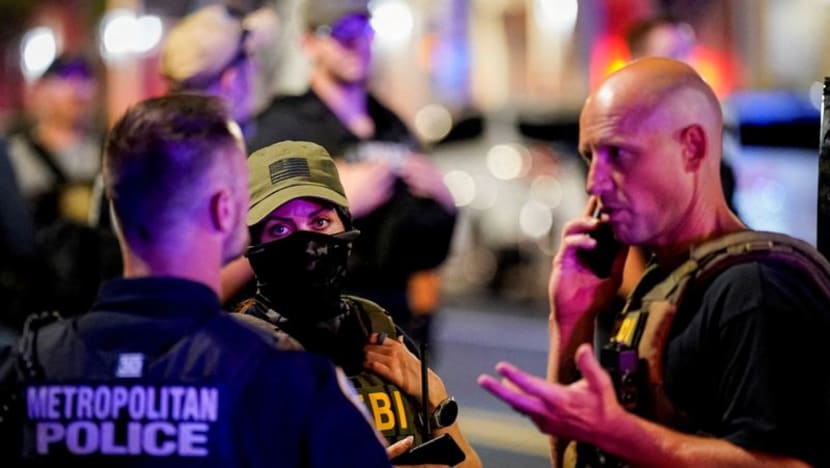World
Trump Deploys Federal Agents in Washington’s Crime Crackdown

A significant increase in federal law enforcement presence in Washington, D.C. has resulted in a series of arrests for minor offenses. Last week, police officers stopped a man carrying a designer handbag after spotting a small plastic bag suspected of containing marijuana. Accompanied by agents from five federal agencies, including the Federal Bureau of Investigation (FBI) and the Secret Service, they seized approximately three ounces of marijuana, exceeding the legal possession limit in the capital. The man now faces misdemeanor charges, punishable by fines and potential jail time.
This incident is part of a broader crackdown on crime initiated by President Donald Trump, who ordered a deployment of hundreds of federal agents and National Guard troops to address what he describes as a crime epidemic in the city. Local leaders, primarily from the Democratic party, have criticized the operation as political theatre rather than a genuine solution to crime rates. The initiative, launched following Trump’s declaration of a crime emergency on August 11, 2023, has led to a surge in federal involvement in local law enforcement.
Focus on Minor Offenses Amid Crime Surge
An analysis by Reuters reveals that the federal task force has engaged in at least 69 local cases since the beginning of the crackdown. Approximately half of these cases involve relatively minor offenses, such as public alcohol consumption or marijuana possession, which typically do not warrant federal attention. The remaining cases include felonies under D.C. law, notably carrying firearms without a license or drug possession with intent to distribute. Notably, none of the cases reviewed involved charges related to violent offenses.
Historically, Washington’s Superior Court has managed local criminal cases, with federal agencies rarely intervening. The recent surge in federal involvement has raised questions about the effectiveness and necessity of such actions. “The American taxpayer is not spending all this money for highly trained special agents to replicate local law enforcement,” said Jeff Cohen, a former legal adviser at the Bureau of Alcohol, Tobacco, Firearms and Explosives. The federal government claims that the initiative has resulted in the removal of over 1,000 dangerous criminals from the streets, including gang members and individuals involved in violent crimes, though this figure remains unverified.
Impact of Federal Agents on Local Law Enforcement
The Justice Department reported that 2,500 personnel from 20 different agencies have been deployed to Washington, asserting that this has led to a reduction in crime. They dismissed any claims suggesting otherwise as “not based in reality.” Critics, however, question the actual impact of this increased presence on crime rates and community safety.
During the operation, many drug-related arrests began with stops for minor infractions. In one incident on August 20, 2023, a vehicle search led to the seizure of 1.65 pounds of marijuana. On another occasion, three days later, officers seized 36 ounces of marijuana from a suspect. While some arrests involved small quantities, others were significant enough to warrant possession with intent to distribute charges.
Legal experts express concern that the current approach may not address the root causes of crime. Jeffrey Fagan, a professor at Columbia Law School, questioned the rationale behind deploying additional federal resources. He pointed out that effective crime reduction typically involves identifying and incapacitating repeat offenders rather than focusing on low-level offenses.
The current strategy has prompted mixed reactions. While some instances demonstrate the effectiveness of increased law enforcement presence—such as agents apprehending a fleeing suspected drug dealer—there remain doubts about the clarity of objectives for this operation. Many cases reviewed involved standard police work that could have been handled by local authorities without the involvement of federal agents.
As the crackdown continues, the balance between local and federal law enforcement remains a topic of debate, with implications for how crime is addressed in urban areas moving forward.
-

 Lifestyle3 months ago
Lifestyle3 months agoHumanism Camp Engages 250 Youths in Summer Fest 2025
-

 Sports3 months ago
Sports3 months agoDe Minaur Triumphs at Washington Open After Thrilling Comeback
-

 Business4 months ago
Business4 months agoKenvue Dismisses CEO Thibaut Mongon as Strategic Review Advances
-

 Sports4 months ago
Sports4 months agoTupou and Daugunu Join First Nations Squad for Lions Clash
-

 Top Stories4 months ago
Top Stories4 months agoColombian Senator Miguel Uribe Shows Signs of Recovery After Attack
-

 World4 months ago
World4 months agoASEAN Gears Up for Historic Joint Meeting of Foreign and Economic Ministers
-

 Business4 months ago
Business4 months agoOil Prices Surge Following New EU Sanctions on Russia
-

 Health3 months ago
Health3 months agoNew Study Challenges Assumptions About Aging and Inflammation
-

 Entertainment3 months ago
Entertainment3 months agoDetaşe-Sabah Violin Ensemble Captivates at Gabala Music Festival
-

 Entertainment3 months ago
Entertainment3 months agoBaku Metro Extends Hours for Justin Timberlake Concert
-

 Business4 months ago
Business4 months agoU.S. House Approves Stablecoin Bill, Sends to Trump for Signature
-

 Top Stories4 months ago
Top Stories4 months agoRethinking Singapore’s F&B Regulations Amid Business Closures









